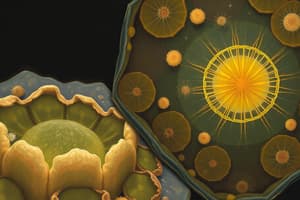Podcast
Questions and Answers
What is the definition of an element according to Boyle's postulation?
What is the definition of an element according to Boyle's postulation?
- A substance that can be broken down into simpler components.
- A pure, simple substance that cannot be changed to simpler forms. (correct)
- A basic unit of matter composed of molecules.
- A mixture of different pure substances.
Which of the following is a component that Aristotle proposed as constituting matter?
Which of the following is a component that Aristotle proposed as constituting matter?
- Electricity
- Gasses
- Dust (correct)
- Atoms
What happens to gases under the specified conditions in discharge tubes?
What happens to gases under the specified conditions in discharge tubes?
- They vibrate and heat up.
- They become liquid.
- They emit sound waves.
- They conduct electricity. (correct)
How do the atoms of each element differ?
How do the atoms of each element differ?
What was believed about cheap metals according to historical alchemical beliefs?
What was believed about cheap metals according to historical alchemical beliefs?
What is the trend in the sequence of numbers listed from 0 to 1:30?
What is the trend in the sequence of numbers listed from 0 to 1:30?
How frequently do the numbers appear in the sequence up to 1:30?
How frequently do the numbers appear in the sequence up to 1:30?
What does the structure of the sequence suggest about its purpose?
What does the structure of the sequence suggest about its purpose?
Which time marker represents the shortest interval in the sequence?
Which time marker represents the shortest interval in the sequence?
What is the final time listed in the sequence?
What is the final time listed in the sequence?
Flashcards are hidden until you start studying
Study Notes
Building Blocks of Matter
- The body is made of building units called atoms.
- Atoms are minute particles that are indivisible and fundamental to all matter.
- Atoms from different elements exhibit distinct characteristics and properties.
Historical Perspectives on Matter
- Aristotle proposed that matter consists of four elements: water, air, dust, and fire.
- There was a belief that base metals could be transformed into precious metals, illustrating early alchemical ideas.
Boyle's Contribution
- Boyle defined elements as pure substances that cannot be simplified through conventional chemical methods.
Dalton's Atomic Theory Highlights
- Matter is composed of atoms, which are indivisible.
- Different elements have unique types of atoms.
Cathode Rays Discovery
- In 1897, gases were found to not conduct electricity under normal conditions but could under specific conditions in a discharge tube.
- A pressure range of 0.01-0.001 mmHg and a potential difference of around 10,000 volts resulted in the emission of cathode rays, producing a fluorescent glow.
Studying That Suits You
Use AI to generate personalized quizzes and flashcards to suit your learning preferences.




